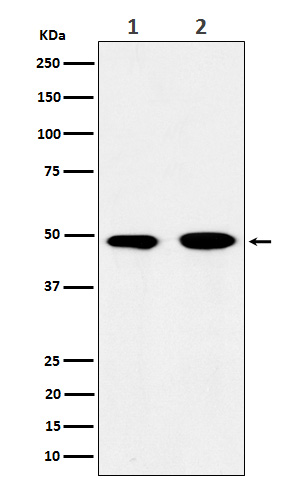eIF3e Rabbit mAb [DLlP]Cat NO.: A47447
Western blot(SDS PAGE) analysis of extracts from (1) 293T cell lysate; (2) Jurkat cell lysate.Using eIF3e Rabbit mAb [DLlP]at dilution of 1:1000 incubated at 4℃ over night.
Product information
Protein names :eIF3e; EIF3S6; eIFe;
UniProtID :P60228
MASS(da) :52,221
MW(kDa) :45kDa
Form :Liquid
Purification :Affinity-chromatography
Host :Rabbit
Isotype : IgG
sensitivity :Endogenous
Reactivity :Human,Mouse,Rat
- ApplicationDilution
- 免疫印迹(WB)1:1000-2000
- 免疫荧光(ICC/IF)1:100
- The optimal dilutions should be determined by the end user
Specificity :Antibody is produced by immunizing animals with A synthesized peptide derived from human eIF3e
Storage :Antibody store in 10 mM PBS, 0.5mg/ml BSA, 50% glycerol. Shipped at 4°C. Store at-20°C or -80°C. Products are valid for one natural year of receipt.Avoid repeated freeze / thaw cycles.
WB Positive detected :(1) 293T cell lysate; (2) Jurkat cell lysate.
Function : Component of the eukaryotic translation initiation factor 3 (eIF-3) complex, which is required for several steps in the initiation of protein synthesis (PubMed:17581632, PubMed:25849773, PubMed:27462815). The eIF-3 complex associates with the 40S ribosome and facilitates the recruitment of eIF-1, eIF-1A, eIF-2:GTP:methionyl-tRNAi and eIF-5 to form the 43S pre-initiation complex (43S PIC). The eIF-3 complex stimulates mRNA recruitment to the 43S PIC and scanning of the mRNA for AUG recognition. The eIF-3 complex is also required for disassembly and recycling of post-termination ribosomal complexes and subsequently prevents premature joining of the 40S and 60S ribosomal subunits prior to initiation (PubMed:17581632). The eIF-3 complex specifically targets and initiates translation of a subset of mRNAs involved in cell proliferation, including cell cycling, differentiation and apoptosis, and uses different modes of RNA stem-loop binding to exert either translational activation or repression (PubMed:25849773). Required for nonsense-mediated mRNA decay (NMD),may act in conjunction with UPF2 to divert mRNAs from translation to the NMD pathway (PubMed:17468741). May interact with MCM7 and EPAS1 and regulate the proteasome-mediated degradation of these proteins (PubMed:17310990, PubMed:17324924)..
Tissue specificity :Ubiquitously expressed. Expressed at highest levels in appendix, lymph, pancreas, skeletal muscle, spleen and thymus..
Subcellular locationi :Cytoplasm. Nucleus, PML body.
IMPORTANT: For western blots, incubate membrane with diluted primary antibody in 1% w/v BSA, 1X TBST at 4°C overnight.


